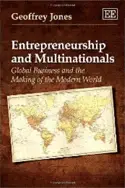
Firms As Actors
From Chapter 1 Entrepreneurship and Multinationals: Global Business and the Making of the Modern World
By Geoffrey Jones
Entrepreneurs and firms have been important actors in the making of our modern global world. Forty years ago this would not have needed to be said. As the pace of globalization speeded up from the 1960s, the term "multinational enterprise" (hereafter MNE) was coined, and there was an outpouring of discussion, much of it critical, about the political, social, and economic role of large global firms. MNEs were perceived to be so powerful that they posed a threat to the nation state.
Yet as historians, economists and other scholars have discovered that globalization has a long history, so the role of business enterprises has tended to be written out of the script. The neglect of firms is apparent across disciplines. For several decades academic historians devoted almost no attention to businesses as such, as they focused on the role of culture, race, gender, and religion in historical developments. Mainstream historians, Beckert recently observed, "largely ceded interpretative hegemony when it comes to matters of economic change to economists, political scientists, sociologists, and a host of popular writers." A renewal of interest in the "history of capitalism" is finally beginning to correct this peculiar omission.
Related Article
An Interview With The Author
Economic historians, often in recent decades trained in economics and employed in economics departments, have remained focused on economic change, but have often paid little attention to firms. In exploring globalization, they have done pioneering work in quantifying historical trends in the integration of world markets. They have shown that the second half of the nineteenth century witnessed a deeper globalization than ever seen previously using that criterion. By 1914 world capital, commodity and labor markets were closely integrated, and more integrated than they were to be for several decades thereafter. Yet this literature has had much more to say about international trade and institutional structures than about entrepreneurship and MNEs. Indeed, the story of the creation of the nineteenth-century global economy has been written about without mentioning a single business enterprise. Political scientists, although more interested in firms, have focused primarily on the politics and policy decisions which impacted and drove globalization. Sociologists, who have approached the subject of globalization from the perspective of organizations, have primarily focused on states and intergovernmental organizations.
This book makes the case that the role of business needs to be more centrally incorporated into narratives explain the making of the modern world. Broadly, it explores a number of key questions. Were entrepreneurs and firms architects, co-architects, or consumers of the modern world? How important were they compared with governments and other institutional actors in building global capitalism? Were they followers of fashions and trends, or creators of them? Could they dictate to consumers and governments? Or were they dictated to? MNEs have been described by Alfred D. Chandler and Bruce Mazlish, two prominent historians, as a "new kind of Leviathan," which had "an impact on almost every sphere of modern life from policymaking on the environment to international security, from issues of personal identity to issues of community, and from the future of work to the future of the nation-state." How powerful were these so-called Leviathans, and how did their power change over time? If business was a shaper of global capitalism, was its force for good, or otherwise?
These questions remain as relevant today as in the past, and perhaps even more so, given both the pace of globalization in today's world, and the reappearance of multiple critics. This book is motivated by the belief that it is important to provide robust historical evidence on which to inform opinions and judgment about both the present and the future.
